Delhi: Very Urban, Sometimes Challenging, Immensely Rewarding Past Review
By A student (Middlebury College) - abroad from 12/27/2017 to 05/05/2017 with
Middlebury Schools Abroad: Middlebury in Delhi
Academically, I learned a lot about Bengali history, thinkers, philosophers and resistance movements in my history course. I also gained a new understanding of India's current right-wing political climate and the BJP by talking to my classmates, traveling to certain areas, and witnessing protests and political demonstrations. I developed new perspectives on the present-day impacts and relevance of historical processes and events such as colonialism and Partition in Delhi. On a more personal level, I learned about the importance of self-care and creating the time & space to relax. I am not from an urban area, so figuring out how live in a major city while still taking care of myself & giving myself intentional downtime to recharge was a useful learning process. I found myself visiting lots of parks, galleries, monuments, and other open and quiet spaces.
Review Photos
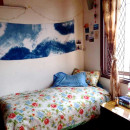
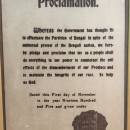
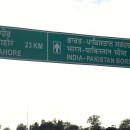
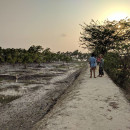
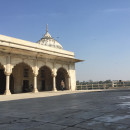
Personal Information
| How much international exposure did you have prior to this program? | 6 months+ |
Review Your Program
|
* Overall educational experience
Academic rigor, intensity, resources, etc. |
Lady Shri Ram College (the host university) has very good history and literature departments. I especially enjoyed my history course ("History of India: 1857-1950," taught by Professor Debatri Bhattacharjee). We analyzed multiple critical thinkers in the areas of postcolonial theory, feminist historical analysis, and Bengali history as well as in-depth case studies from across India. This course kept me on my toes since I hadn't been exposed to most of the material previously, but my classmates and Professor Bhattacharjee were very helpful and engaging. I also enjoyed the social atmosphere at LSR. The vibe on campus is lovely, and the student body is quite diverse: they come from all over India and beyond. I was actually able to learn quite a lot about other regions of India through talking to my classmates. The quirks and bureaucracies of the Indian education system require a bit of adjustment, but students who embrace the opportunity and express full enthusiasm will get a lot of the experience of attending LSR. However, students should also be aware that while 3rd year courses are typically the most suitable for college juniors from an academic perspective, LSR students in these classes will have known each other for a long time and breaking the ice with them may require a bit more effort. Delhi as a city is quite intense but I enjoyed having access to the opportunities that living in such an urban context provided (museums, cultural events, delicious food, easy access to transport, etc.) Delhi's architectural legacy is absolutely incredible, and I really enjoyed visiting old Mughal monuments and structures. The program provides support as necessary but offers students a high degree of personal freedom, which I appreciated. I enjoyed the independence of the lifestyle. Students are definitely able to take time to explore other parts of Delhi (and other parts of India!) but I also really came to love the routine of daily life in our neighborhood (going to the market, cooking, working in cafes, going for walks, going to the local gym, etc.) |
|
* Host Country Program Administration
On-site administration of your program |
The on-site program director is adept at helping students access support systems & resources as needed (healthcare referrals, travel help, etc.) She even coordinated a visit and information session specifically for the students on our program at the Fulbright House in Delhi, where she used to work. The program also coordinates a handful of trips each semester. The costs associated with these trips are covered mostly by the tuition of the program. In Spring 2017 we travelled as a group to both Amritsar and Sundarbans National Park, and the trip to Sundarbans inspired my research topic for my senior thesis. I eventually travelled back to Sundarbans and also visited multiple libraries and archives for my research. Our program director was very helpful during this process and produced letters granting me access to government archives. |
|
* Housing:
How satisfied were you with your living arrangements? |
The apartment is basic but comfortable and has all of the essential amenities. I really loved my room because it happened to have a lot of natural light, although I did also feel that there was a big disparity between the rooms. Some were much brighter than others. Rooms are generally shared between two students depending upon the number of program participants. |
| * Food: |
I liked being able to cook for myself with inexpensive and local ingredients! I taught myself how to cook during my time in Delhi, which was fun. On days when I was feeling too tired to cook it was also very easy to order delicious food from any number of great local restaurants through an app called Zomato, or we would go out to eat. The food on campus at the LSR canteen is tasty and affordable. I recommend the rajma rice as a good basic, healthy dish. The crunchy spring roll was another one of my favorites. The Aunty who works in the canteen is cheerful, playful and very happy to provide suggestions. She'll tell you off if you get the same thing too many times in a row without trying something new. |
|
* Social & Cultural Integration:
How integrated did you feel with the local culture? |
This is a challenging thing to assess or quantify. Delhi is a large city so students should exercise some caution, as they would anywhere. However, the vast majority of people who I interacted with were very lovely (as they tend to be anywhere). Going into the experience students should just be aware of the ways in which various facets of their identity might impact both their interactions with people as well as their own perceptions of the place, space and culture. Having good support systems to process these things with is crucial. |
|
* Health Care:
How well were health issues addressed during the program? |
Didn't have any serious health issues during my time in Delhi- yay! There was one time when I needed to see a doctor for something minor, and the hospital was hygienic and also very affordable. The doctor and staff were friendly and professional. The Middlebury program also has a connection with a counselor in Delhi who is able to provide emotional support to students if necessary. If the doctor or the counselor affiliated with the program weren't able to provide the right kinds of support to students, I'd imagine that it would be quite easy to find other professionals in such a large city. Delhi has pretty state-of-the-art healthcare. In terms of everyday health, I generally felt pretty good. The air quality in Delhi isn't excellent, which is a serious environmental problem for the city, but I personally felt alright most of the time. |
| * Safety: |
There are safety risks and concerns as there would be in any large city. As long as students carry charged phones with them and use common sense, Delhi is fairly safe. |
| If you could do it all over again would you choose the same program? |
Yes
|
Finances
|
* Money: How easily were you able to live on a student's budget?
(1 = not very easy/$200+ on food & personal expenses/week, 2.5 = $100/week, 5 = very easily/minimal cost) |
While India is certainly extremely cheap compared to the U.S., Delhi is much more expensive than other parts of India. It is possible to live quite inexpensively, but it's also easy to overestimate the exchange rate sometimes and spend money more quickly than you might realize if you are eating out a lot, traveling, etc. On the whole, though, the program was very affordable and I was able to live a quite comfortable lifestyle for not very much money. It is possible to negotiate prices for many things, but students should also be aware of their privilege when doing this. |
| Do you have any general money-saving tips for future study abroad participants? | Cook for yourself, take public transport (or share rides), buy clothing, bedding, toiletries, and everything else over there instead of buying new things specifically for the program before you leave. There are very few things that you can't find in Delhi. Buy produce and other groceries from the local vendors (wallahs) when possible instead of grocery stores. Support small local businesses. Take your LSR ID with you everywhere. There are lots of student discounts at museums, memorials, etc. For example, at the National Gallery of Modern Art (one of my favorite spots in the city) admission is free for students with an Indian student ID, but RS 500 for foreign nationals. When traveling, book transport, hotels or hostels in advance and read the reviews- it's possible to find nice accommodation for relatively low prices, but don't necessarily go for the very cheapest ones. They might be a bit dirty or sketchy. There are some places in India where you can travel a bit more spontaneously, but many places require a little bit of planning before you leave (and booking online in advance is often cheaper than booking on the spot). Take an overnight train at least once. Trains are my favorite mode of transport in India. They are so much fun and they're very affordable, especially if you book in advance. You must typically book through an agent if you don't have an Indian credit/debit card, though. |
Language
| * Did your program have a foreign language component? | Yes |
|
How much did the program encourage you to use the language?
0 = No encouragement, 5 = frequent encouragement to use the language |
Many people in Delhi speak at least some English. There are also certain linguistic power dynamics to be aware of- while some people are very excited to help you practice Hindi (such as LSR classmates!) some people feel as though they are being talked down to if you try to address them in Hindi and they will respond in English. This is part of the legacy of colonialism in India. I wish that I'd had more opportunities to actively practice my Hindi, and I also wasn't very confident in my speaking skills, but I used it when possible. |
| How would you rate your language skills at the beginning of the program? | None |
| How would you rate your language skills at the end of the program? | Beginner |
| What was the highest level language course you had completed prior to departure? | IB French ab initio (high school), two years |
| How many hours per day did you use the language? | |
| Do you have any tips/advice on the best ways to practice the language for future study abroad participants? | Try to practice the basics as much as possible in your interactions with people. Watch Hindi movies and listen to Hindi music. |
Other Program Information
|
* Where did you live?
Select all that apply |
|
|
* Who did you live with?
Select all that apply |
|
|
* Who did you take classes with?
Select all that apply |
|
| About how many local friends did you make that you will likely keep in touch with? |
A Look Back
| * What did you like most about the program? |
|
| * What could be improved? |
|
| * What do you know now that you wish you knew before going on this program? | Make sure that you introduce yourself to your professors on the first day of class and explain that you are an exchange student and won't be taking the DU final exams. Many of my professors were very confused by my presence at first and didn't seem to totally understand how the exchange program worked. Talk to them about your assessment plans early on as well so that you are both on the same page and have a clear sense of how you'll be marked for the course. |
Individual Course Reviews
| Course Name/Rating: |
History of India: 1857-1950 |
| Course Department: | History |
| Instructor: | Debatri Bhattacharjee |
| Instruction Language: | English |
| Comments: | |
| Credit Transfer Issues: |
| Course Name/Rating: |
World Literature |
| Course Department: | English |
| Instructor: | Dipti Nath and Jonathan Koshy Varghese |
| Instruction Language: | World Literature |
| Comments: | Poetry Section: read poets of the Americas (Neruda, Walcott and Atwood) with a postcolonial lens. General Literature Section: read Garcia's "Chronicle of a Death Foretold,"Thiong'o's "The trial of Dedan Kimathi," and Fo's "Accidental Death of an Anarchist." Class discussions were varied but tended to center around themes of gender, violence and political suppression. Analyzed the poetry of Naomi Shihab Nye and Margaret Atwood for the final paper, which was very flexible (I received some guidance and input from the professors but they encouraged me to take it in my own direction, which I enjoyed.) |
| Credit Transfer Issues: |








